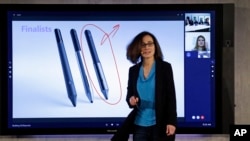Revealing its price tag for the first time, Microsoft will sell a bigger version of its new, wall-mounted video-conferencing and digital whiteboard device for $20,000, making it the most expensive product in its hardware line-up, the software company said on Wednesday.
Orders start July 1 for the Surface Hub, which Microsoft hopes will become a fixture in meeting rooms around the world.
It will run a custom version of Windows 10, Microsoft's new operating system due out in late July. Deliveries will start in September.
Despite the hefty price tag, Microsoft is betting that the Surface Hub will appeal to businesses that are used to spending multiples of that amount on conference room facilities.
"The theoretical market may be much bigger than the actual market," said JP Gownder, an analyst at tech research firm Forrester. He said the device likely will not be an instant hit with businesses, but should appeal to companies where collaborative work is important, such as product design or marketing and advertising.
Integrating video-calling and note-taking onto a touch screen, the Surface Hub traces its roots back to products made by Perceptive Pixel, an Oregon-based company Microsoft bought in 2012. Microsoft unveiled a prototype of the new device in January.
It is the latest step in Microsoft's foray into high-tech hardware, starting with the launch of the Surface tablet in 2012 and the purchase of Nokia's handset business last year.
An 84-inch screen version will sell for $20,000. A smaller 55-inch version will sell for $7,000.
The Surface Hub will "pay for itself and make money" said Mike Angiulo, who runs Microsoft's devices group.
Angiulo would not reveal how many Surface Hubs are being produced, but said there was a large potential market of millions of conference rooms used by organizations worldwide.
There is no clear market segment for the Surface Hub, which blends elements of video conferencing systems such as those made by Cisco Systems and digital whiteboards made by Panasonic and others. The only directly comparable product is the Mondopad, made by InFocus, which is priced slightly lower than Microsoft's offering.
The larger Surface Hub model, which is just over four inches (10 cm) thick and weighs 280 lbs (127 kg), features the biggest single piece of glass for an electronic product in production, Angiulo said. Microsoft makes the devices in Wilsonville, Oregon.
